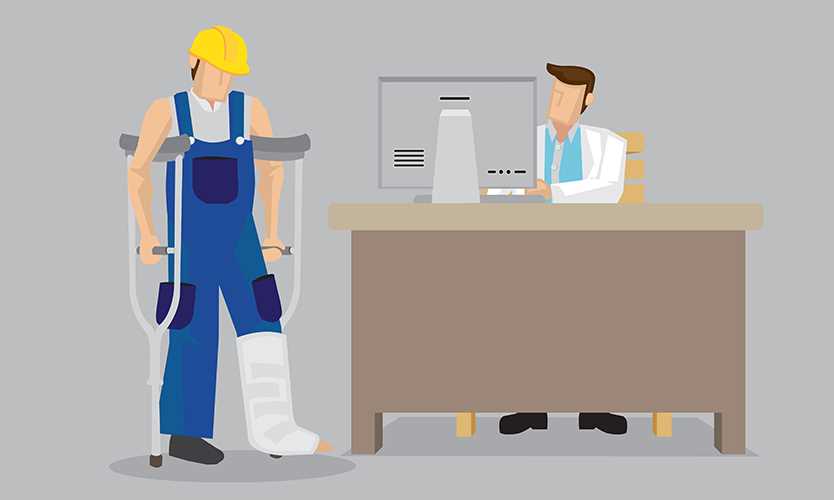
Being injured at work is a rare event for most workers, and understanding what is actually happening is not easy in some instances when it comes time to re-enter the workforce. All workers comp cases are unique to some degree, and especially when the injured worker can return in another capacity or in a restricted activity situation.
This is not necessarily available to all workers. However, insurance companies and company management can sign off on this step when the physicians will release the patient back in to the work environment. The primary problem with this arrangement is that it creates blurred lines between the worker’s job responsibilities and requirements, which can often create a scenario where the employer can claim insubordination or some other reason for permanently releasing any injured employee.
Here are a few tips on how manage working while in a restricted physical capacity.
When is the right time to return?
The time to return to work is typically when an injury has completely rehabilitated, or at least as much as possible. Some injuries do not totally heal, also known as maximum medical improvement, or MMI. Employers commonly expect a worker to perform their job duties just as before the injury when returning. In addition, physicians are potentially liable when they release patients early who subsequently suffer another injury or more damage to the prior medical problem.
Insurance companies and employers can request a second opinion on a worker’s rehabilitation just as with a primary evaluation, with the second doctor being one of their choosing. Also termed as an independent medical exam, or IME, the real truth is this doctor is rarely neutral and objective in their alternate diagnosis and prognosis.
Always remember that this doctor is commonly a network doctor who is focused on a counter-claim against the original treating physician diagnosis and prognosis. The IME doctors are not your friends, as their actual purpose is assisting the insurance provider in reducing the value of the claim or end it altogether. It is always best to discuss the return with the original doctor as well, and consider consulting with an attorney before going back to work.
If the primary original treatment doctor releases the worker, the worker is legally bound to return according to any restrictions. A workers comp attorney can be invaluable when an injured worker is being “encouraged” to return to work in a limited capacity.
What are the potential issues when returning to work on restriction?
Just because employers are agreeable when placing an injured employee on workers compensation insurance does not mean that they will be as amiable when the worker returns to work. Employers and their insurance providers alike understand that limiting the value of a claim could be accomplished by a justified termination even if the facts and claims of each party are inconsistent.
Employers cannot directly terminate an injured employee due to the claim, but they have significant power to create an indirect or additional issue for termination in the “at will” employment system. Having an experienced workers comp attorney overseeing the return to work can be important in avoiding any subsequent disciplinary problems the employer may create in their attempt to reduce a claim value or terminate an employment relationship completely.
Ensuring Employment Parameters When Going Back to Work
The possibility of returning to work in a limited capacity is one of the primary reasons any injured worker should have legal counsel throughout the process even when an employer has been agreeable to receiving workers comp benefits. Some companies have a policy prohibiting light duty assignment, and allowing a worker to come back with restrictions could well be a red flag that they have an alternate plan for legal termination.
Employers are insulated from a costly personal injury general damages claim per the structure of the workers comp law. However, employers who are non-compliant may want to hide their negligence by playing nice at first and setting a trap for the returning employee.
Always carry a copy of your “return to work with restrictions letter” complete with designated restrictions regarding work duties to ensure that all parties understand the conditions, including immediate supervisors who are typically left out of the corporate information loop.
Immediate supervisors could actually be given instructions to create a termination issue or be particularly difficult on the returning employee within the scope of employment authority.
When You Need an Attorney

The real truth about a workplace injury claim is that consultation with a workers compensation attorney should be done immediately after the injury. And even when this is not done, consultation should happen as soon as possible when anything seems amiss in program benefits processing. Insurance companies are well-known for beginning benefits just to put a private investigator on the case to justify stopping benefits later.
In addition, employees rarely understand what management is doing in operating a business, and many times employers are negligent regarding compliance with Occupational Safety and Health Administration requirements.
Violations of OSHA rules and regulations can establish negligence when the failure to comply contributes to causation of a workplace injury, and an experienced and aggressive workers comp attorney will understand how to identify when noncompliance is occurring and creating employer liability for a long-term general damages claim even when a worker can return to work.
Always remember that returning to work after workers comp benefits stop is a crucial juncture in any employment relationship. Employers are regularly outwardly acceptable to receiving workers comp benefits in the beginning while developing an alternate plan for termination upon the return.
They could be hiding something that establishes additional liability for long-term medical issues, and their insurance providers could be operating in bad faith when providing benefits. Always retain an experienced workers compensation attorney as soon as possible even after being placed on injury leave because your claim could be much more valuable than you realize.
Injured employees have very little official capacity to investigate their own claim, but a workers compensation lawyer can conduct a full independent employer audit and investigation in maximizing a benefits claim, including an additional general damages personal injury lawsuit if negligence is found.
